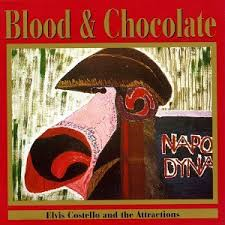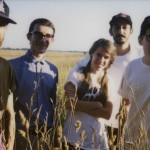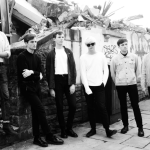 In 1986, it looked as though Elvis Costello was basically irrelevant. His last effort, Goodbye Cruel World, had been universally panned as a self-indulgent, tuneless wreck, and he’d been keeping a low profile ever since. After less than a decade as an artist, he seemed to be out of momentum.
In 1986, it looked as though Elvis Costello was basically irrelevant. His last effort, Goodbye Cruel World, had been universally panned as a self-indulgent, tuneless wreck, and he’d been keeping a low profile ever since. After less than a decade as an artist, he seemed to be out of momentum.
But if Goodbye Cruel World was a record of self-loathing, Blood & Chocolate was about turning that rage outward. Coming off an acrimonious divorce and nearly driven to blows with The Attractions, Costello was bursting with anger, frustration, and resentment – and he poured it all into his songwriting. Blood & Chocolate ranks among the most vicious albums ever made; the most virulent heavy metal seems like James Blunt by comparison.
This is Elvis Costello & The Attractions at the height of their powers, delivering both chiming pop perfection (Next Time Round) and twisting, sprawling epics (Tokyo Storm Warning). Age has done nothing to soothe this album’s ferocity; it’s a sonic assault that still draws more blood than Pete Doherty armed with a syringe. And with the opening bursts of the aptly named, two-chord Uncomplicated the mission statement here is plain: this is Costello not giving a fuck about what anyone else wants to hear.
From the lyrical absurdity of the opener (‘A horse that knows arithmetic/And a dog that tells your fortune’) to the descriptions in Tokyo Storm Warning of a place ‘between the Disney abattoirs and the chemical refinery,’ Blood & Chocolate features some of Costello’s sharpest wordplay, delivered at a breakneck pace. Is there a better kiss-off to a cheating ex than “The words of love seem cruel and crass/When you’re tough and transparent as armored glass”? Not to mention the snarling Blue Chair, whose tight musicianship belies a bitter sarcasm: “You say your love lasts forever,” he sneers to the new man, “when you know the night is just hours.”
If one theme lingers over Blood & Chocolate, it’s obsessive love. Infidelity and the cuckold are everywhere, but nowhere more potently than I want You,a depiction of possession and desire that makes Every Breath You Take sound like the portrait of a healthy relationship. “I want to hear the things you did that we do too,” he hisses, “I want to hear he pleases you than I do.” Nearly 7 minutes long, it builds with measured intensity and bursts, devolving into a breathless, whispering repetition of the song’s title, as Costello sounds like a man on the verge of murder – this isn’t a song to play with the lights off.
For an album this brutal, this obsessed with revenge and violence, the music never gives out, and that’s what makes it so listenable. It remains one of his fastest, most energetic pieces, yet makes time for moments of subdued power. Bruce Thomas delivers a near-perfect rhythm section, particularly with the excellent I Hope You’re Happy Now, on par with This Year’s Model. But while that album was a loose, punky affair, this is a ‘mature’ album – without any of the dreaded connotations – it still rattles the bones, but with tightness, precision, and murderous intent.
Even when things slow down on the epic “Battered Old Bird,” the effect is only to increase the sense of unease rather than disarm it, as Costello weaves the narrative of his childhood apartment building and its murderous, perverted, alcoholic tenants; the song builds in scale until it hits its dizzying climax. Battered Old Bird, like every song on this album, showcases how powerful Costello had vocally become – rather than subdued or even nasal as on My Aim is True, here he sounds like a classically trained rocker with an extra set of pipes; perhaps that’s partly in debt to Nick Lowe’s production, but it’s more of a testament to a man constantly searching for self-improvement.
Costello has never really found a niche – when he burst onto the scene in 1977, he was lumped in with the punks. Despite being pre-new-wave, he was later consigned to the Blondie scene. As a songwriter, he’s handled nearly every genre imaginable – rock, country, pop, blues, soul, jazz, classical – it’s all been done before. But somehow, Costello still sounds the best when he cuts loose of his pretensions and embraces the true rock ethic. After Blood & Chocolate, he’d go on a relentless journey of exploration and creativity. But he’d never sound this free, this exuberant, this wonderfully nasty again.



